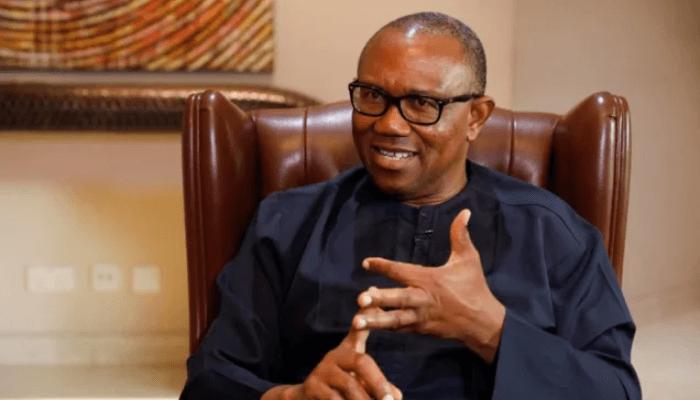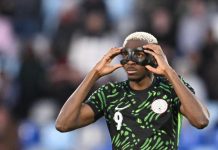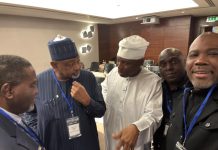Africa-Press – Nigeria. Peter Gregory Obi CON ( born 19 July 1961) is a Nigerian businessman and politician who served as governor of Anambra from March to November 2006, February to May 2007, and June 2007 to March 2014. In May 2022, he became the Labour Party nominee for President of Nigeria in the 2023 presidential election, after defecting from the Peoples Democratic Party.
Born in Onitsha in 1961, Obi graduated from the University of Nigeria in 1984. Afterwards he entered business and banking, eventually holding several executive positions at banks. Obi ran for governor in 2003 as a member of the All Progressives Grand Alliance, but Chris Ngige was declared winner of the election. In 2006, the election of Chris Ngige was nullified and Obi was declared winner of the 2003 election, and he assumed office in March 2006. He was impeached in November the same year, but his impeachment was overturned and he returned to office in February 2007. Obi was removed after the 2007 Anambra State gubernatorial election, but the judiciary again intervened by ruling that he should be allowed to complete a full four-year term. In 2010, he was re-elected to a second term.
After leaving office in 2014, Obi decamped to the Peoples Democratic Party.In 2019, he was selected as the PDP vice presidential nominee in the presidential election running alongside Atiku Abubakar, but the ticket lost to incumbent president Muhammadu Buhari and vice president Yemi Osinbajo. In 2022, Obi ran for president himself, first in the PDP until defecting to the LP in May 2022 to obtain its nomination. Obi’s presidential campaign has been described as populist and has been noted for its support among many young Nigerians, who have been nicknamed “Obidients”.
Early life and education
Peter Obi was born on 19 July 1961 in Onitsha, Anambra State. He attended Christ the King College, Onitsha, where he completed his secondary school education. He was admitted to the University of Nigeria, in 1980 and graduated with a B.A. (Hons) in philosophy in 1984.
Peter Obi has completed executive education programs at the following schools; Lagos Business School, Harvard Business School, the London School of Economics, Columbia Business School, the International Institute for Management Development, Kellogg School of Management of Northwestern University, Saïd Business School of Oxford University and the Judge Business School of Cambridge University.
Business career
Obi was a businessman before he ventured into politics. He held leadership positions in some private establishments.
Some of the companies he served include: Next International Nigeria Ltd, Chairman and Director of Guardian Express Mortgage Bank Ltd, Guardian Express Bank Plc, Future View Securities Ltd, Paymaster Nigeria Ltd, Chams Nigeria Ltd, Data Corp Ltd and Card Centre Ltd. He was the youngest chairman of Fidelity Bank Plc.
First term
Peter Obi contested in the Anambra State Governorship Election as a candidate for the All Progressives Grand Alliance (APGA) party in 2003; but his opponent, Chris Ngige of the People’s Democratic Party, was declared winner by the Independent National Electoral Commission (INEC).
After nearly three years of litigation, Ngige’s victory was overturned by the Court of Appeal on 15 March 2006. Obi took office for governorship on 17 March 2006. On 2 November 2006, he was impeached by the state house of assembly after seven months in office and was replaced the next day by Virginia Etiaba, his deputy, making her the first-ever female governor in Nigeria’s history. Obi successfully challenged his impeachment and was re-instated as the governor on 9 February 2007 by the Court of Appeal sitting in Enugu. Etiaba handed power back to him after the court ruling.
Peter Obi once again left office on 29 May 2007 following the General Elections, in which Andy Uba was declared the winner by the electoral body. Obi returned to the courts once more, this time contending that the four-year tenure he had won in the 2003 elections only started to run when he took office in March 2006. On 14 June 2007 the Supreme Court of Nigeria upheld Obi’s contention and returned Obi to office. This brought to an abrupt end the tenure of Obi’s successor, Andy Uba whose 14 April 2007 election the Supreme Court nullified on the grounds that Obi’s four-year tenure should have remained undisturbed until March 2010.
Second term
On 7 February 2010, the Independent National Electoral Commission (INEC) declared Peter Obi the winner of the 2010 Anambra State Gubernatorial election. He defeated Professor Charles Chukwuma Soludo, former governor, CBN. This election victory gave Governor Obi an additional four years as the governor of Anambra State.
On 17 March 2014 Peter Obi served out his second term and handed over the governorship to Willie Obiano.After leaving office in 2014, Obi gained new status as an advocate for good governance and national political figure after decamping to the Peoples Democratic Party in 2014.
After the 2015 General Election, President Goodluck Jonathan appointed Peter Obi as the chairman of the Nigerian Security and Exchange Commission (SEC).
2019 presidential elections
On 12 October 2018, Peter Obi was named as the running mate to Atiku Abubakar, the Peoples Democratic Party’s Presidential Candidate in the 2019 presidential election. As a candidate for Vice President, Obi opposed proposals for a standardized national minimum wage, arguing that different states should have different minimum wages. The Abubakar/Obi ticket came second.
2023 presidential candidacy
On 24 March 2022, Peter Obi declared his intention to run for the position of President of Nigeria under the platform of the Peoples Democratic Party, but later pulled out and announced he would be running under the Labour Party platform instead. According to the Peoples Gazette, Peter Obi wrote to the leadership of the Peoples Democratic Party on 24 May to resign his membership.Obi reportedly complained of massive bribing of delegates and vote buying at party’s presidential primary, citing the existence of a party clique collaborating against him.
Obi’s business background and status as a major candidate not affiliated with either of Nigeria’s two main parties has drawn comparisons with Emmanuel Macron’s successful 2017 French presidential candidacy.Obi has expressed admiration for Macron and was among the officials who received Macron during his visit to Lagos
Obidient Movement
Younger generations under 30 proved to be some of the biggest Obi’s supporters, showing their support via social media and protests and street marches. Aisha Yesufu, a prominent activist noted as the cofounder of the #BringBackOurGirls movement and a supporter of the End SARS campaign, endorsed Obi in her first-ever endorsement of a presidential candidate.
Young supporters of Obi’s campaign have been nicknamed “Obidients”.[In an article in Business Day, it was argued that:
“[The Obi-Dients] are attracted by Peter Obi’s ideology of frugality, economic production rather than the ostentatious consumerism and waste, and resourceful management and investment in key sectors, for economic growth and development.”
Commentators have argued that Obi’s third party candidacy appeals to young voters dissatisfied with the two major parties, which has resulted in the “biggest political movement in recent Nigerian history.” With his core message of prudence and accountability, Obi has managed to gain the backing of voters for his previously largely unknown Labour Party into a strong third force against two political heavyweights. Before campaigns were officially kicked off, Obi’s supporters held a series of One Million Man Marches in several Nigerian cities including Makurdi, Calabar, Lafia, Port Harcourt, Afikpo, Owerri, Enugu, Auchi, Abuja, Kano, Ilorin, Abakaliki and Ibadan. The marches were not part of the official campaigns; as they were led by volunteer Obi supporters and not Obi’s in-house team or political party. The marches experienced massive turnouts.
Dr. Obiageli Ezekwesili, a former Minister of Education in Nigeria in an interview with Channels Television said that Nigerian women are more inclined toward the presidency of Peter Obi.
Selection of running mate
Physician Doyin Okupe initially served as the temporary running mate of Obi until a substantive candidate could be selected. In the run-up to the final selection of a running mate, media outlets reported that there was an effort to have former Senator Shehu Sani of Kaduna State serve as Obi’s running mate.
On 8 July 2022, Obi unveiled his running mate, Senator Yusuf Datti Baba-Ahmed. Speaking on his choice of the vice presidential candidate, he stated as follows:
“This is our right to secure, unite and make Nigeria productive. And you can do that without having people who have similar visions, ideas and are prepared for the task. So, I have the honour today to present to you, God willing, Nigeria’s next vice president in the person of Senator Yusuf Datti Baba-Ahmed.
Personal life
Peter Obi is a practicing Catholic.[87] He married Margaret Brownson Obi (née Usen) in 1992 and they have two children.
For More News And Analysis About Nigeria Follow Africa-Press







